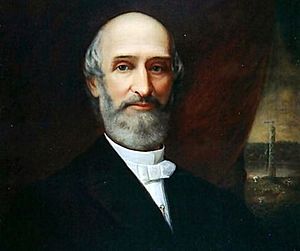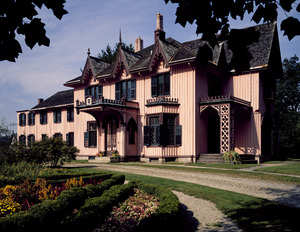Henry Chandler Bowen facts for kids
Henry Chandler Bowen (born September 11, 1813 – died February 24, 1896) was an important American businessman, a kind person who gave money to good causes (a philanthropist), and a publisher. He was a key member of the Plymouth Church in Brooklyn, where he lived for much of his life. He also started a newspaper in New York called The Independent. Henry Bowen built a special summer house in the Gothic style called Roseland Cottage in Woodstock, Connecticut, which was his hometown.
Contents
Early Life and School
Henry Chandler Bowen was born on September 11, 1813, in Woodstock. His parents were George Bowen and Lydia Wolcott Bowen. He went to school at Woodstock Academy and Dudley Academy.
His Career and Businesses
Henry Bowen moved to New York City and started working for a company that sold clothing and fabrics. This company was owned by Arthur Tappan, who was an abolitionist. An abolitionist was someone who worked to end slavery.
Later, Henry Bowen opened his own company, Bowen and McNamee, which specialized in silks. He opened a store on Broadway in a beautiful building designed by English architect Joseph C. Wells. His company later changed its name to Bowen, Holmes and Company in 1859.
Starting The Independent Newspaper
In 1848, Henry Bowen started The Independent. This was a weekly newspaper that was connected to the Plymouth Church in Brooklyn Heights. Henry Bowen was one of the people who helped start this church.
The minister of Plymouth Church, Henry Ward Beecher, was an editor for the newspaper from 1861 to 1863 and wrote for it often. The Independent was very strong in its support for ending slavery and for women's right to vote. Henry Bowen was the main person who paid for the newspaper and published it. From 1870 until he passed away, he was also the editor. By 1870, the newspaper had about 70,000 readers!
Connections to Abraham Lincoln
Even Abraham Lincoln read The Independent newspaper. Henry Bowen was very important in inviting Lincoln to give a speech in New York in February 1860. During that visit, Lincoln also went to Plymouth Church to hear Henry Ward Beecher speak.
Business Challenges
During the American Civil War, Henry Bowen's silk business lost many of its customers, especially those from the Southern states. Because of this, his company, Bowen, Holmes and Company, went out of business. However, by this time, he also earned a lot of money from his fire insurance business and his newspaper, The Independent. In 1853, he had started the Continental Insurance Company.
His Family and Home
Henry Bowen married Lucy Maria Tappan on June 6, 1844. They had 10 children together. Later, he married Ellen Holt on December 25, 1865.
In 1846, he hired the architect Joseph Wells to build his summer home in Woodstock. This house was built in the Gothic Revival style and was named Roseland Cottage. Today, this house is kept safe and is a National Historic Landmark. This means it's a very important historical place in the United States.
Henry Bowen was also one of the first members of the Congregationalist Church of the Pilgrims. Two years later, he helped start Plymouth Church in Brooklyn Heights. Joseph Wells, the same architect who designed his home, also designed Plymouth Church. Henry and his family moved into a house on Willow Street in Brooklyn in the late 1840s or early 1850s.
Fourth of July Celebrations
Starting in 1870, Henry Bowen hosted big Fourth of July celebrations at his Roseland Cottage. Four different United States Presidents visited his summer home as guests and speakers for these parties! They were Ulysses S. Grant, Benjamin Harrison, Rutherford B. Hayes, and William McKinley. Other famous visitors included Henry Ward Beecher, Julia Ward Howe, Oliver Wendell Holmes, and John C. Fremont.
Henry Bowen was very generous to his hometown of Woodstock, Connecticut. He gave money to his old school, Woodstock Academy. In 1876, he also gave Roseland Park to the town for everyone to enjoy.
 | Jessica Watkins |
 | Robert Henry Lawrence Jr. |
 | Mae Jemison |
 | Sian Proctor |
 | Guion Bluford |



